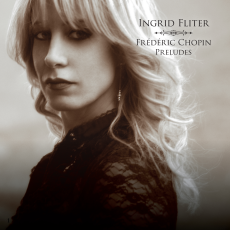Ingrid Fliter - Chopin: Preludes - BBC Radio 3 ‘CD Review’
ON: The interesting thing; I'd like to mention first of all - the liner notes are very fine in this. On occasion one finds themselves reading liner notes and taking real attention, and they mention André Gide said ‘What are these Preludes to?' And of course they were at least the preludes to Debussy's Preludes. And although people asked the question about what Chopin's Preludes are the preludes to, nobody ever seems to ask the question about Debussy. I don't know...
AM: It's funny because that brings in the question I asked Ken Hamilton at the start of Building a Library - what are they for? How should we listen to them? And what happens to them when you play them as a set and have them coming one after another? It's a difficult conundrum for any pianist, isn't it?
ON: Well it is. Listeners sometimes get confused as well; I remember years ago I was asked to illustrate an exhibition of paintings of Ceri Richards. And I was told that it was all based on the Debussy Preludes (I know we're talking about Chopin's Preludes, but I'll be quick!), so I quickly memorised the Debussy Preludes I had up to that point not memorised, turned up at the exhibition, ready to play Debussy's Preludes, and the first one was Clair de Lune, which is not a prelude, and the next one was Reflects dans l'eau which is not a prelude! And I was at a severe disadvantage all the way through, so people do get muddled about preludes. But in performances as beautiful as Ingrid Fliter's performances are, I think one needn't be puzzled, one can just listen.
<music>
ON: That's lovely isn't? I had a student play that a little while ago, as a sarabande, in an attempt to find something new to say, but Ingrid Fliter just plays it and it's wonderful - seems to me.
AM: That was the 5th, 6th and 7th from the Opus 28. I used to love playing that middle one... (laughs)
ON: That's the one we ignored when we were little.
AM: Okay so these aren't the studies, are they? The demands are still pretty high though.
ON: They are. There's a very interesting Faust study where the harmony tells us that Chopin really did mean it to be fast and of course Fliter can do it.
<music>
AM: Ingrid Fliter playing Chopin's B flat minor Prelude from the Opus 28. It's not necessarily as fast and fiery and fleet - it is marked con fuoco - as some, but then she gives us time to bring in that lovely rubato.
OM: Yes and it all fits in. It is very much a serial performance of the Preludes, which is very enjoyable to listen to as a whole.
AM: So you're getting a proper sense of a journey? Even if that's...
OM: I found. We needn't ask that question this morning. Yes, I enjoyed the whole set. And then I enjoyed the fillers, of course it's not enough for a whole CD, there's mazurkas and nocturnes to fill, and I particularly like the C sharp minor Mazurka with it's wonderful repeated rhythms and the melodic imagination that Ingrid Fliter brings to bear on it.
<music>
AM: Ingrid Fliter in Chopin's Mazurka, Op. 63 No. 3. You see things written by various critics saying ‘born to play Chopin' and we might find that, rather, a sort of testing thing to write, and you listen to playing like that and think ‘fair enough'.
OM: Well that's very true, but in fact, there's so many ways to be born to play Chopin.
AM: Well exactly.

